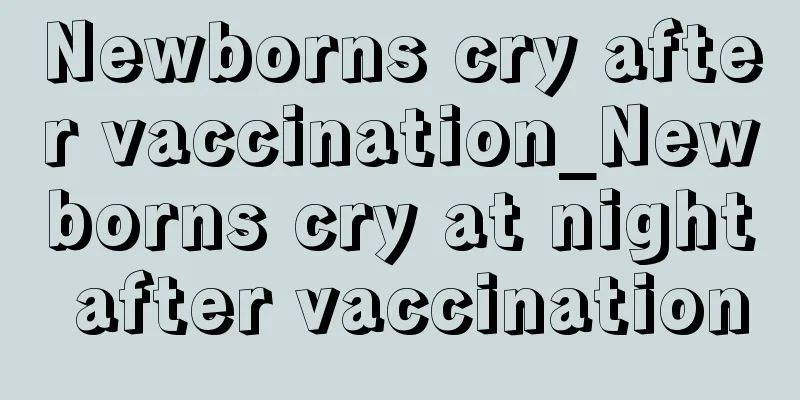What can’t a 1-year-old baby eat? These foods must be avoided

|
For a one-year-old baby, the digestive system is still very fragile, so the digestive ability is very limited. There are many things that cannot be eaten, such as honey, seafood, soy products and peanut butter, etc. These are very good foods for ordinary people, but it is best not for one-year-old babies to eat them. 1. Honey Although drinking honey water has its benefits, honey is not sterilized at high temperatures during the manufacturing process to avoid destroying its ingredients, so it may contain botulinum spores, which may cause botulism poisoning in infants under one year old. It is recommended that babies under one year old should not consume honey. 2. Peanut butter Peanuts themselves contain arachidonic acid, an essential fatty acid needed by the human body. Human cells use this acid to synthesize prostaglandins, which are well-known natural inflammatory substances in the human body that can easily cause allergies and inflammatory reactions. If food allergies run in your family, it is best to avoid feeding your child peanut products before the age of one. In addition, peanut butter can easily be contaminated by aflatoxin due to improper storage. According to food hygiene standards, the aflatoxin content in peanuts and their products must not exceed 15ppb. If you accidentally consume a large amount of food contaminated with aflatoxin, it can cause acute liver poisoning or even death. 3. Fresh milk Fresh milk is rich in nutrients, but it is not suitable for babies under one year old. The main reason is that the casein protein in fresh milk has a large molecular structure and is difficult to decompose, so it cannot be absorbed by babies under one year old. In addition, if some babies' intestines do not have enough lactase to break down lactose, it will cause intestinal irritation and affect bowel function. In addition, certain minerals may increase the burden on the baby's kidneys, causing the child to have symptoms such as chronic dehydration and dry stools. Especially for babies under one year old, breast milk is the best. Otherwise, formula milk should be chosen because formula milk will adjust the protein and fat structure, the calcium-phosphorus ratio, and add some vitamins, trace elements, nucleotides, unsaturated fatty acids and other essential ingredients for infant growth and development to provide complete nutrition for their development. 4. Protein Eggs are rich in high-quality protein, as well as minerals such as calcium, phosphorus, iron, and various vitamins. However, the digestive ability of babies before one year old is not able to cope with these rich nutrients, and the ingredients in the protein can easily cause allergic reactions. Therefore, it is recommended that babies who have started to eat complementary foods eat only egg yolks and not egg yolks. Most allergens are large-molecule proteins. Normal gastrointestinal function has sufficient protection to resist the invasion of foreign proteins. However, the gastrointestinal tract of infants and young children is still immature, and the digestive juices are insufficient to decompose them, and the immunoglobulin secretion is low. When they come into contact with these proteins, allergens can easily enter the body and cause allergic reactions. 5. Seafood The main problem with seafood is that it is difficult to preserve and easily spoils, and spoiled seafood can easily cause allergies. Babies whose gastrointestinal functions are not yet fully developed are inherently more sensitive, and their bodies often react more strongly to unclean food than adults. Therefore, it is recommended to eat less before the age of one. Some foods can easily cause gastrointestinal problems due to their storage methods, ingredients, and texture. Babies under one year old have immature gastrointestinal tracts and immune systems. To avoid gastrointestinal discomfort and allergic symptoms, it is best to eat less of them. Even if they do eat, eat in small amounts. 6. Bean products The protein contained in beans is already a high allergen, and they also contain a large amount of oligosaccharides that are difficult to digest and can easily cause bloating. For babies with thin abdominal wall muscles, abdominal bloating is easy to occur. If they eat bean products that cause bloating, it will make the situation even worse. Therefore, do not let your baby eat bean products such as soy milk, dried tofu, tofu, red beans and mung beans for the time being. |
<<: Can babies eat scallops? This is what parenting experts say
>>: How to treat laryngeal wheezing in children? 6 treatment methods
Recommend
2 months premature
Generally, fetal development takes about 10 month...
What to do if your six-month-old baby has a hoarse voice
Many parents find that their babies have hoarse v...
What are the symptoms of increased intracranial pressure in children?
Increased intracranial pressure in babies has a g...
What factors are related to children's coughing and bleeding?
Cough in children is one of the most common disea...
One year old baby poop smells bad
A one-year-old baby is still in the period of nee...
What kind of exercise can children do to grow taller?
As we all know, our height is determined by innat...
What is the matter with the two-year-old baby vomiting and diarrhea?
Children's stomachs and intestines are not as...
Purple tongue in newborn
In traditional Chinese medicine, observing the co...
What causes swollen eyelids in children?
Sometimes parents wake up and find their children...
Neonatal urachal fistula
A urachal fistula usually occurs in newborns and ...
What are the effects of cerebral palsy in children?
Cerebral palsy is a relatively serious childhood ...
What causes heavy eye bags in children?
Bags under the eyes are a very common phenomenon ...
Baby's ear is scratched and water is flowing
For first-time mothers and fathers, the most impo...
How to tell if a child is mute?
As babies grow up, they will have problems with e...
What should I do if a 13-year-old girl has hereditary big toes?
In fact, a disease like bunion is not a very scar...









